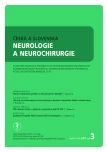Acute Choreatic Syndrome: A Case Report
Authors:
A. Kopal 1; V. Dostál 1; E. Krasulová 2; E. Ehler 1
Authors‘ workplace:
Neurologické oddělení, Krajská nemocnice Pardubice
1; Neurologická klinika 1. LF UK a VFN, Praha
2
Published in:
Cesk Slov Neurol N 2007; 70/103(3): 336-339
Category:
Case Report
Overview
A case-report of a young woman with acute choreatic syndrome has been presented. The patient has autoimmune disorders in history (Graves-Basedow disease, idiopathic thrombocytopenic purpura) and the presence of lupus anticoagulant. Antiphospholipid syndrome was diagnosed by consequential investigations. Antiphospholipid syndrome (APS) is a thrombophilic state characterized by vascular (arterial and venous) trombosis, spontaneous pregnancy loss and the presence of antiphospholipid antibodies (anti-cardiolipin antibodies or lupus anticoagulant). The main pathogenetic mechanism is a vascular obstruction induced by hypercoagulation. APS can be primary or secondary in a variety of autoimmune diseases (systemic lupus erythematosus, rheumatoid arthritis, autoimmune thyreoiditis and others). Neurological manifestations of APS are various. There are especially ischemic stroke, cerebral venous thrombosis, migraine. Chorea or other dyskinesia, dementia, epilepsy can also occur in association with APS. In the treatment for APS aspirin and anticoagulants are recommended.
Key words:
chorea – antiphospholipid syndrome – thyreopathy – idiopathic thrombocytopenic purpura
Sources
1. Miyakis S, Lockshin MD, Atsumi T, Branch DW, Brey RL, Cervera R et al. International consensus statement on an update of the classification kriteria for definite antiphospholipid syndrome (APS). J Tromb Haemost 2006; 4 : 295-306.
2. Lampropoulos Ch, Hughes G. The antiphospholipid (Hughes´) syndrome: changing the face of neurology. Eur J Intern Med 2004; 3 : 147-50.
3. Durrani OM, Gordon C, Murray PI. Primary anti-phospholipid antibody syndrome (APS): Current concepts. Surv Ophthal 2002; 3 : 215-38
4. Miesbach W, Gilzinger A, Gökpinar B, Claus D, Scharrer I. Prevalence of antiphospholipid antibodies in patients with neurological symptoms. Clin Neurol Neurosurg 2006; 2 : 135-42.
5. Gallo P, Sivieri S, Ferrarini A, Giometto B, Ruffatti A, Ritter E et.al. Cerebrovascular and neurological disorders associated with antiphospholipid antibodies in CFS and serum. J Neurol Sci 1994; 122 : 97-101.
6. Castillo P, Woodruff B, Caselli R, Vernino S, Lucchinetti C, Swanson J, et.al. Steroid-responsive encefalopathy associated with autoimmune thyroiditis. Arch Neurol 2006; 63 : 197-202.
7. Chrobák L. Diagnóza a terapie idiopatické trombocytopenické purpury v dospělosti. Vnitr Lek 2002; 8 : 773-80.
8. Krause I, Blank M, Fraser A, Lorber M, Stojanovich L, Rovensky J et al. The association of thrombocytopenia with systemic manifestations in the antiphospholipid syndrome. Immunobiology 2005; 10 : 749-54.
9. Miranda M, Cardoso F, Giovannoni G, Church A. Oral contraceptive induced chorea:another condition associated with anti-basal ganglia antibodies. J Neurol Neurosurg Psychiatry 2004; 75 : 327-8.
10. Robertson WC, Smith CD. Sydenham`s chorea in the age of MRI: A case report and review. Pediatr Neurol 2002; 27 : 65-7.
11. Dale RC. Autoimmunity and the basal ganglia: new insights into old diseases Q J Med 2003; 96 : 183-91.
12. Růžička E, Roth J, Kaňovský P et al. Dyskinetické syndromy a onemocnění. In: Roth. J, Havrdová E, Židovská J, editors. Chorea. 1st ed. Praha: Galén 2002 : 53-90.
Labels
Paediatric neurology Neurosurgery NeurologyArticle was published in
Czech and Slovak Neurology and Neurosurgery

2007 Issue 3
- Advances in the Treatment of Myasthenia Gravis on the Horizon
- Hope Awakens with Early Diagnosis of Parkinson's Disease Based on Skin Odor
- Memantine in Dementia Therapy – Current Findings and Possible Future Applications
-
All articles in this issue
- The Effects of Mono- and Bi-Segmental Cervical Discectomy with Interbody Replacement: A Prospective One-Year´s Study
- IgE Antibody Serum Level Changes in Patients after Severe Head Injuries
- The Brain MR Imaging in Patients with Myotonic Dystrophy DM 1
- The Stroke Unit Benefit for Improved Diagnostics in Patients with Cerebro-Vascular Accidents
- Craniospinal Irradiation in Children with Medulloblastoma in Supine Position: Long-Term Results
- Epileptosurgical Solution of Cavernous Hemangioma Associated with Focal Cortical Dysplasia in the Right Temporal Lobe in a Female-Patient with Secondary Epilepsy: a Case Report
- Osmotic Demyelination Syndrome – MRI Diagnosis: a Case Report
- Late Manifestation of Wilson’s Disease: A Case Report
- The Brain Metastasis of a Large-Cell Neuroendocrine Thymic Cancer: a Case Report
- Cerebral Blood Flow Variations in Imaging
- The Efficacy of Sonothrombotripsy and Sonothrombolysis on Accelerated Recanalization of the Middle Cerebral Artery
- Primary Heart Tumors as a Cause of Embolization into the Central Nervous System: Ten-Years´ Experience
- Hydrocephalus after Subarachnoidal Hemorrhage – The Effects of Therapeutical Modalities for Aneurysm
- Osteoplastic Decompressive Craniotomy
- Decompressive Craniotomy in Craniocerebral Injury – Evaluation of Outcome One Year After Trauma
- Chiari Malformation: Own Experience
- Acute Choreatic Syndrome: A Case Report
- Czech and Slovak Neurology and Neurosurgery
- Journal archive
- Current issue
- About the journal
Most read in this issue
- Chiari Malformation: Own Experience
- Osmotic Demyelination Syndrome – MRI Diagnosis: a Case Report
- The Brain MR Imaging in Patients with Myotonic Dystrophy DM 1
- Osteoplastic Decompressive Craniotomy
